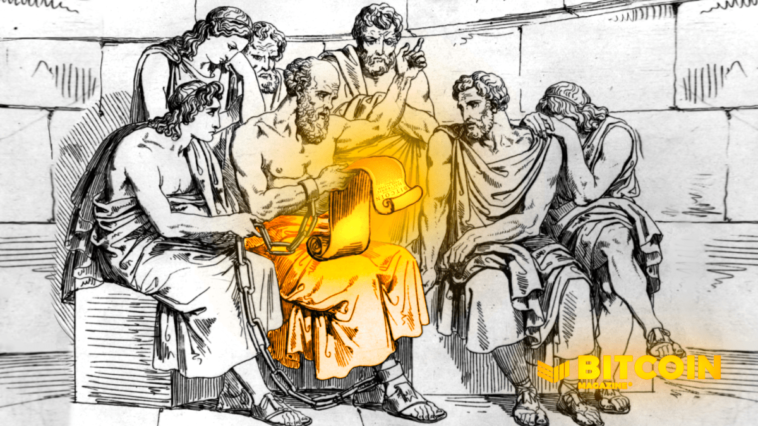Aristotle would likely have been a Bitcoiner because he recognized the benefits of private property and wealth development through natural trade.
This is an opinion editorial by Joe Moffett, a creator and author. He is dedicated to philosophizing and extreme deductive reasoning in a world of hot takes.
Aristotle had a lot to say about money, but what would he have said about bitcoin?
“There are two sorts of wealth-getting, as I have said; one is a part of household management, the other is retail trade: the former necessary and honorable, while that which consists in exchange is justly censured; for it is unnatural, and a mode by which men gain from one another. The most hated sort, and with the greatest reason, is usury, which makes a gain out of money itself, and not from the natural object of it. For money was intended to be used in exchange, but not to increase at interest. And this term interest, which means the birth of money from money, is applied to the breeding of money because the offspring resembles the parent. Wherefore of an modes of getting wealth this is the most unnatural.” (Source)
Now it may be unwise for me to criticize Aristotle, but there seems to be some faulty logic in this assessment of commerce. Aristotle is effectively saying three things here while recognizing the benefits of private property:
- Wealth-getting is noble when it is a part of household management.
- Retail wealth development is unnatural and is rightly criticized.
- Money lending is essentially an immoral act.
The study of economics and praxeology has developed in such a way that we can look at these three statements and recognize the flaws in his argument, but it is easy to understand the reasoning behind his belief. Aristotle, as a student of Plato, had great reverence for ethics and a harmonious society. Where Plato saw central planning as the option — such as a communistic or heavily planned socialist system — Aristotle saw private property ingrained in the human experience, therefore a necessity for individual responsibility and education.
So how is this logic flawed?
The first statement is not flawed; I think most people today would agree that value creation to amass wealth in order to manage and provide for a household is noble. The second statement, however, is in conflict with the first. If wealth acquisition is essential and noble to household management, why would retail commerce and the money trade be considered unnatural? In other parts of his book “Politics,” Aristotle even recognizes how money serves the great purpose of being a medium of exchange — to reduce the “double coincidence of wants” — which leads to the next point about money lending.
Although I disagree with Aristotle’s assessment that money lending is an immoral act, I will admit, given credit card fees, high interest and predatory loans, that it’s the most reasonable criticism of commerce in this context. Murray Rothbard, however, was rather disappointed by Aristotle’s opinion on money lending, saying:
“Aristotle would have done better to avoid such hasty moral condemnation and to try to figure out why interest is, in fact, universally paid. Might there not be something “natural’, after all, about a rate of interest? And if he had discovered the economic reason for the charging — and the paying — of interest, perhaps Aristotle would have understood why such charges are moral and not unnatural.” (Source)
Rothbard is likely referring to the benefits of money lending and interest. As Frank Shostak concisely puts it, “Interest is the price we pay for preferring goods sooner rather than later, and a measure of the degree to which we do so.”
The borrower benefits by satisfying their wants earlier, the lender incurs a risk and they lose the benefit of investing those “real savings” into goods, so the borrower pays a fee for the opportunity to convert future savings into immediate goods. To use Aristotle’s example on a small scale: A shoemaker lends $1,000 to a house builder to convert into tools to build the house from savings not yet earned. The shoemaker now incurs a risk of not getting paid back, loses the potential investment he could have made to purchase material for shoemaking or other immediate goods, and the housemaker benefits by being able to create wealth more quickly. The shoemaker deserves a small fee of 5-10% for his support of the builder.
Back to Rothbard’s article “It All Began, As Usual, with the Greeks,” he says something that I’m not as sure I agree with:
“Aristotle, like Plato, was hostile to economic growth and favored a static society, all of which fits with his opposition to money-making and the accumulation of wealth. The insight of old Hesiod into the economic problem as the allocation of scarce means for the satisfying of alternative wants was virtually ignored by both Plato and Aristotle, who instead counseled the virtue of scaling down one’s desires to fit whatever means were available.”
Rothbard makes a good point at the end of his essay when he asserts that Aristotle and Plato did believe in a stoic harmonious society that did not outgrow the natural production of the Earth. However, I’m not sure if I completely agree that Aristotle was hostile to economic growth in general. After all, Aristotle doesn’t say lending money or loans are bad because of economic growth, but instead claims it’s immoral to receive an interest on the loan. My interpretation of Aristotle was that he, as Rothbard says, believed it was virtuous to scale down “one’s desires to fit whatever means were available.”
Plato and Aristotle both described versions of eugenics and believed the world should not overpopulate, more or less, so it’s likely Aristotle tied his economic beliefs to his philosophical worldview.
All that said, the Republic of Rome debased its currency over many years and I’m not aware of how it was disbursed, via a central bank, local bankers, etc., but it was minted by the Republic or Emperor. I think it would be hard to argue with his opinion if the system for money lending was comparable to our current fiat system’s money printing. We are aware the Roman Empire began debasing their currency around 70 B.C., but it’s possible similar systems were in place as early as 350 B.C. while Aristotle was writing about this.
If that’s the case, his commentary on government currency seems to make sense. Aristotle writes, “… but money has become by convention a sort of representative of demand; and this is why it has the name ‘money’ (nomisma) – because it exists not by nature but by law (nomos) and it is in our power to change it and make it useless.”
So how would Aristotle feel about Bitcoin?
If Aristotle lived in the world today, many of his opinions would fit reasonably well in our current structure. Where Plato believed in central planning and controlling people for a better society, Aristotle realized individualism, private property and free will were necessary to the human experience. Aristotle criticized banking and the deification of money. In many ways, you could argue that the way Bitcoiners treat Bitcoin is a form of deification, but in reality it’s the opposite. I may be wrong in this assessment, but the dollar has become society’s god and the Federal Reserve is the church which just keeps printing more for your salvation. It weakens you, while strengthening the power of the dollar through government enforcement and a monopoly on violence.
People love the big numbers that come with money printing and believe never-ending growth is achievable (thanks, John Maynard Keynes!). What people don’t realize is that the almighty dollar is smoke and mirrors, the money printing, burden of debt, future taxes and the loss of liberty is just around the corner. Bitcoin, however, is not a god, but a tool for volunteerism. Bitcoin gives you the right to be more virtuous instead of the obligation to consume. Bitcoin protects liberty, provides opportunity for collaboration like never before, educates the world on the value of saving, and opens channels for complimentary lending and charity when possible. Above all, it’s an awakening for the world; we don’t need banks or governments, simply our own sovereignty.
If Aristotle’s desire was for a medium of exchange that did not exist by law and instead exists through work and the natural trade system of the people using it, bitcoin is the answer. Proof-of-work is the premise that creates this very idea. You could argue that even in Aristotle’s challenge about interest, bitcoin is the perfect solution. In order to create new bitcoin or obtain any bitcoin, it requires proof-of-work of the machine; a machine which requires energy that requires a certain amount of work to run. Aristotle’s issue with money being born from money is resolved with bitcoin, which is instead created through work or effort in the same way gold is found through mining. In addition to this perfect adjustment to government-issued currency, we also can recognize that bitcoin functions as a finite resource and will only allow for so much expansion and contraction.
At a limit of 21 million bitcoin, lending bitcoin requires strategic thinking which breeds competition and efficiency. This will inherently create decentralized banking and improve local community development, making lending a “noble” or natural function. Since there will never be more than 21 million, if the world ran on a Bitcoin standard, every item bought or sold would be commensurable and bitcoin would be the common unit of measure. The world would have more commensurability than we do today because of a single standard that is trusted by the people in order to manage a household.
With bitcoin and proof-of-work, the rich and powerful would not have the same unlimited cash resources as we do in the fiat system, so they could not print money or receive handouts. Some of the flaws of “money” that Aristotle refers to will still exist on a Bitcoin standard as long as human nature exists. However, the methods in which “wealth-getting” occurs will result in more competition, a kinder world and a more just social contract.
Aristotle, the first Bitcoiner.
This is a guest post by Joe Moffett. Opinions expressed are entirely their own and do not necessarily reflect those of BTC Inc. or Bitcoin Magazine.




